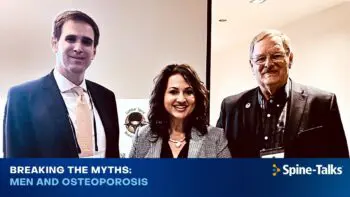Myelopathy is a serious condition where the spinal cord is compressed or damaged, leading to problems with nerve signals from the brain to the body. This can cause pain, weakness, and difficulty with balance and coordination.
Common Causes
- Degenerative changes: Wear and tear on the spine due to aging.
- Herniated discs: When the discs between the vertebrae bulge or break, pressing on the spinal cord.
- Spinal stenosis: Narrowing of the spaces within the spine, putting pressure on the spinal cord.
- Trauma: Injuries from accidents or falls.
- Tumors: Abnormal growths that press on the spinal cord.
- Inflammation: Conditions like rheumatoid arthritis that cause swelling and arthritic changes in the spine.
Symptoms
- Pain in the neck or back, although myelopathy may be painless.
- Weakness in the arms or legs.
- Numbness or tingling in the hands or feet.
- Difficulty with coordination and balance.
- Trouble walking or frequent falls.
- Loss of bladder or bowel control (in severe cases).
Diagnostic Tests
- Physical exam: The doctor checks for pain, muscle strength, reflexes, balance and coordination.
- X-rays: Pictures of the spine to see the bones and any narrowing or misalignment.
- MRI or CT scan: Detailed images of the spine to see the spinal cord and any compression.
- Electromyography (EMG): Tests the electrical activity of your muscles to see how well your nerves are working.
Treatment Options
Non-Surgical:
- Medications: Over-the-counter pain relievers.
- Physical therapy: Exercises to strengthen muscles and improve balance/coordination.
- Injections: Steroid injections to reduce inflammation and pain.
Surgical:
- Decompression surgery: Removing the part of the bone, disc, and ligaments that are pressing on the spinal cord.
- Spinal fusion: Joining two or more vertebrae to stabilize the spine, which is combined with decompression.
Common Conditions That Can Cause Similar Symptoms
- Herniated disc: When the inner part of the disc pushes out through a tear in the outer ring.
- Spinal stenosis without myelopathy: Narrowing of the spaces within the spine, putting pressure on the nerves.
- Multiple sclerosis: A disease that affects the central nervous system.
- Peripheral neuropathy: Damage to the peripheral nerves causing weakness and pain.
When to See the Doctor
- If you have persistent neck or back pain.
- If you experience weakness, numbness, or tingling in your arms or legs.
- If fine motor skills become difficult.
- If you have trouble walking or balancing.
- If you lose bladder or bowel control.
What to Ask the Doctor
- What is causing my symptoms?
- What treatment options are available?
- How long will it take to recover?
- What are the risks and benefits of surgery?
- How can I prevent further complications?
Home Remedies for Mild Symptoms
- None: Myelopathy is a serious condition of the spinal cord that requires consultation with a spine surgeon.
Understanding myelopathy can help you recognize these worrisome signs and symptoms, and to seek medical advice and what questions to ask your doctor. Early detection and treatment can help manage the condition and improve your quality of life.



